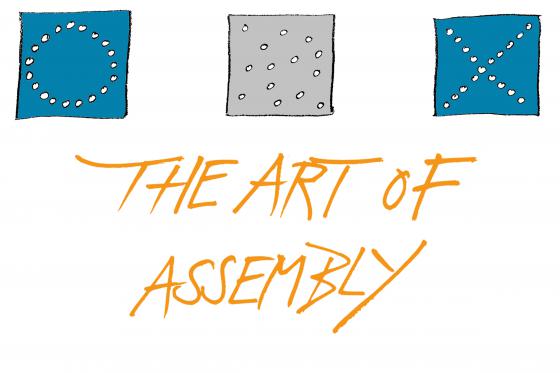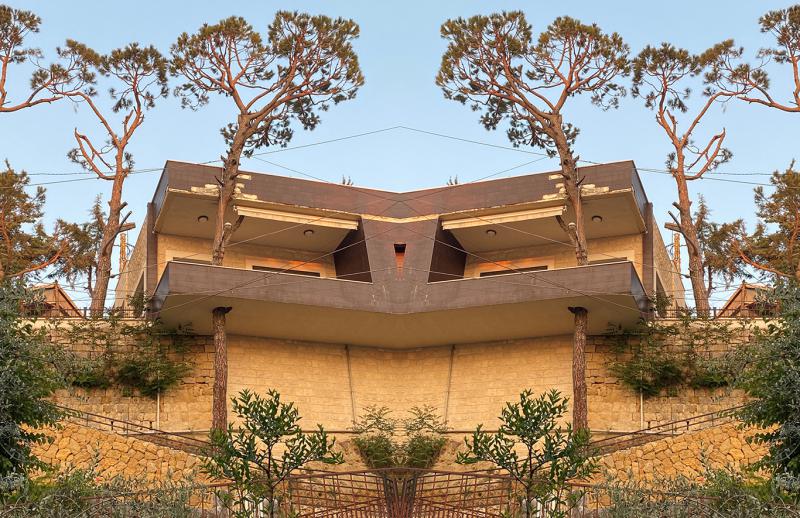Florian Malzacher
Gesellschaftsspiele: The Art of Assembly VI. ASSEMBLING MORE THAN HUMANS
With Radha D‘Souza & Sibylle Peters. Hosted by Florian Malzacher
Discussions about representation in assemblies, democracies and legal cases are usually reserved to human beings. But recent discussions around the Anthropocene and new materialism have fiercely challenged such anthropocentric limitations. Professor for Law Radha D’Souza argues that the concept of rights is fundamentally flawed as it is always associated with private property, contracts, and contractual social relations. Drawing on insights from indigenous cultures and everyday practices, she points out the centrality of assembly for collective life among animals and humans. Performance maker and theorist Sibylle Peters deals in her practice as theorist and theatre maker since many years with concepts of assembling – recently also trying to create zones of companionship in which humans and other co-species can come together without food chains or zoo cages getting in-between.
 Visit art-of-assembly.net for videos, podcasts and background info
Visit art-of-assembly.net for videos, podcasts and background info
About The Art of Assembly. Lectures, discussions, online platform
Whether in Tunis, Cairo, Madrid, or Lisbon, in Athens, New York, London, or Istanbul, in post-Fukushima Tokyo, in the midst of Niemeyer’s iconic parliamentary architecture in Brasilia, under the umbrellas of Hong Kong, or on the streets of Minneapolis: social and political movements of recent years have often been characterised by their search for alternative forms of gathering, of arguing and making decisions, of negotiating community and society. The potential of these assemblies lies in more than just the demands they put forward; many of them change reality merely by practicing radical models of democracy.
The arts have also shown a renewed interest in concepts of gathering and creating public spheres in which society is not only mirrored but constantly tried out, performed, tested, reimagined, or even reinvented. There are court hearings on artistic freedom, religion, and censorship; tribunals on exploitation and violence; summits on climate change or cultural policy; parliaments allowing those who are usually silenced to speak... Theatre in particular has become a stage for assemblies on the fine line between art and reality, a democratic arena of radical imagination.
But what is the future this concept of gathering has ahead of it after months in a state of emergency that has thrown pretty much all areas of social life out of step? Gesellschaftsspiele: The Art of Assembly brings together protagonists from various fields of art, politics and theory to speculate on the future of assembly in a time of experiencing that nothing is certain – a time in which every form of physical togetherness has become precarious.
Florian Malzacher is a curator, dramaturg and writer. 2013-2017 he was artistic director of Impulse Theater Festival (Cologne, Dusseldorf and Mulheim/Ruhr), and 2006–2012 co-programmer of the multidisciplinary arts festival steirischer herbst (Graz). He (co-)curated e.g. the 4th and 5th International Summer Academy (Mousonturm Frankfurt, 2002 and 2004), “Dictionary of War” (2006/07), “Truth is concrete” (Graz, 2012), “Artist Organisations International” (HAU Berlin, 2015), “Appropriations” (Ethnological Museum Berlin, 2014), “Sense of Possibility” on the occasion of the 100th anniversary of the revolution (St. Petersburg, 2017), “Training for the Future” (Ruhrtriennale 2018/19 with Jonas Staal), “After Supervising the Machinery” (2020). As a dramaturge he worked with artists like Rimini Protokoll (DE), Lola Arias (ARG), Mariano Pensotti (ARG), and Nature Theater of Oklahoma (USA). Florian Malzacher has edited and written numerous essays and books on theatre and performance and on the relationship between art and politics. His latest publications include Gesellschaftsspiele. Politisches Theater heute im Alexander Verlag Berlin. florianmalzacher.tumblr.com
The Art of Assembly is based on
Florian Malzacher. Gesellschaftsspiele. Politisches Theater heute. Berlin: Alexander Verlag, 2020.
Pressestimmen
Florian Malzacher interview with Deutschlandfunk Kultur
"It matters that as bodies we arrive together in public, that we are assembling in public; we are coming together as bodies in alliance in the street and in the square. […] So this is a politics of the public body, the requirements of the body, its movement and voice. […] We sit and stand and move and speak, as we can, as the popular will, the one that electoral democracy has forgotten and abandoned. But we are here, and remain here, enacting the phrase, “we the people.”"
Judith Butler, Occupy Wall Street, 2011
Credits
With Oliver Marchart, Chantal Mouffe, Sibylle Peters, Julia Ramírez-Blanco, Milo Rau, Oliver Ressler, Dana Yahalomi / Public Movement and others Guests on June 16th Radha D‘Souza & Sibylle Peters Curated by Florian Malzacher
A production by brut – Koproduktionshaus Wien GmbH in cooperation with Kunsthalle Wien
In cooperation with Münchner Kammerspiele and Wiener Festwochen
Dates & Tickets
June 2021
Online Livestream via brut-wien.at
Event recommendations
With Didier Eribon and Chantal Mouffe. Hosted by Florian Malzacher
Gesellschaftsspiele: The Art of Assembly VII. as part of Wiener Festwochen
AGONISTIC GATHERINGS
Freundliche Mitte
Sportplatz Europa. Order your board game now!
Europe, a Sports Field

